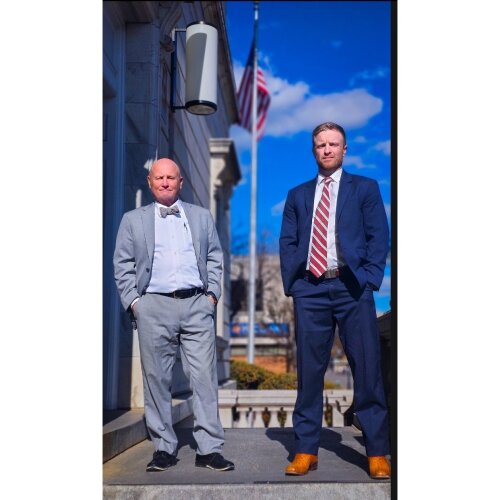Best Toxic Mold Lawyers in Alabama
Share your needs with us, get contacted by law firms.
Free. Takes 2 min.
Or refine your search by selecting a city:
List of the best lawyers in Alabama, United States
About Toxic Mold Law in Alabama, United States
Toxic mold can be a serious concern for homeowners, tenants, landlords, and property managers in Alabama. Toxic mold refers to certain types of mold, such as black mold (Stachybotrys chartarum), that produce toxins harmful to human health. Mold infestation often arises from water damage, leaks, or excessive moisture in buildings. In Alabama, the legal landscape concerning toxic mold includes elements of landlord-tenant law, real estate disclosure, and premises liability. Laws exist to protect those who have been exposed to harmful mold due to another party's negligence or failure to maintain a safe, habitable environment.
Why You May Need a Lawyer
Legal assistance may be necessary in a variety of toxic mold situations in Alabama:
- Tenant-Landlord Disputes: When landlords neglect to address water damage or mold issues, tenants may need legal help to enforce their rights under Alabama’s habitability laws or to pursue compensation for health issues or lost property.
- Real Estate Transactions: If you have purchased a property and later discover hidden toxic mold, you may need legal support to investigate potential non-disclosure or misrepresentation by the seller or real estate agent.
- Personal Injury Claims: Individuals suffering health problems due to mold exposure can consult a lawyer to recover damages for medical expenses, lost income, or pain and suffering.
- Insurance Claims: Disputes with insurance companies about coverage for mold damage often require experienced legal advocacy to ensure fair compensation under your policy.
- Employer-Employee Conflicts: Employees who become ill from mold in the workplace may need legal guidance regarding workers' compensation or unsafe work environment claims.
Local Laws Overview
Alabama’s laws regarding toxic mold are derived from several legal areas:
- Landlord-Tenant Act: The Alabama Uniform Residential Landlord and Tenant Act requires landlords to maintain rental units in a habitable condition. While mold is not explicitly mentioned, landlords may be held responsible if mold results from their failure to address leaks or ensure proper ventilation.
- Disclosure Requirements: Alabama law does not have a specific statewide requirement for sellers or landlords to disclose mold, but they cannot actively conceal known defects. Failure to disclose known dangerous mold might result in legal liability.
- Personal Injury: Individuals exposed to toxic mold due to another party’s negligence may pursue legal action for personal injury or property damage. Plaintiffs usually need to show the responsible party failed to maintain the property or did not warn of hazards.
- Insurance Law: Homeowner and renters insurance policies vary on mold coverage. Disputes can arise if insurers deny mold-related claims, particularly when damage results from long-term neglect versus sudden accidental leaks.
- Statutes of Limitations: Alabama law limits how long you have to file a lawsuit, usually two years from the discovery of harm for personal injury or property damage claims.
Frequently Asked Questions
What is toxic mold and why is it dangerous?
Toxic mold refers to certain molds that release mycotoxins, which can cause severe health issues, especially in people with allergies, asthma, or weakened immune systems. Black mold is one of the most well-known toxic molds.
What should I do if I find mold in my rental property?
Notify your landlord in writing as soon as possible and request prompt remediation. Alabama landlords must maintain habitable living conditions under state law, and ignoring mold could violate those obligations.
Can I withhold rent if my landlord does not fix a mold problem?
Alabama laws do not specifically allow tenants to withhold rent for repairs, but you may choose to terminate your lease if the landlord does not address habitability issues after notice. Always seek legal advice before stopping rent payments.
Are there laws requiring landlords or sellers to disclose mold in Alabama?
Alabama does not have specific mold disclosure laws. However, sellers and landlords may be liable if they intentionally hide known mold problems or provide false information during a sale or lease transaction.
How can I prove my health problems are related to toxic mold?
Medical documentation and professional mold testing are essential. A lawyer can help connect you with qualified experts to demonstrate causation in legal claims.
Does my homeowner’s insurance cover mold damage?
Coverage varies. Many policies exclude mold resulting from long-term neglect but may cover sudden water damage that leads to mold. Check your policy and speak with an attorney or insurance advocate if you have a claim dispute.
Can I sue my employer for mold exposure at work?
You may be entitled to workers' compensation or may have grounds for a lawsuit if the employer ignored hazardous conditions. Consult with an employment or personal injury lawyer for guidance.
How long do I have to take legal action for toxic mold in Alabama?
The statute of limitations is typically two years from when you discovered the injury or property damage, but specific facts can alter this deadline. Timely consultation with a lawyer is important.
What kind of damages can I recover in a toxic mold lawsuit?
Victims can pursue compensation for medical bills, property damage, lost wages, relocation costs, and sometimes pain and suffering, depending on the case details.
Do I need a lawyer for a toxic mold issue, or can I handle it myself?
Some simple disputes may be resolved directly, but serious health, financial, or legal consequences make professional guidance highly advisable to protect your rights and maximize your compensation.
Additional Resources
- Alabama Department of Public Health - Provides guidelines for mold identification, prevention, and remediation.
- Alabama State Bar - Referral services to find qualified attorneys with experience in mold and property law cases.
- U.S. Environmental Protection Agency (EPA) - Offers detailed information about mold, health risks, and cleanup procedures.
- Consumer Financial Protection Bureau - Tips for avoiding home purchase scams and understanding insurance coverage.
Next Steps
If you are dealing with toxic mold in Alabama, gather any relevant documentation, such as medical records, photos, repair receipts, correspondence with landlords or sellers, insurance policies, and inspection reports. Reach out to a qualified attorney who understands local real estate, landlord-tenant, or personal injury law to advise you on your rights and legal options. Timely action is critical, both to protect your health and to meet legal deadlines. Many attorneys offer free initial consultations, allowing you to discuss your situation and determine the best course of action without financial commitment.
Lawzana helps you find the best lawyers and law firms in Alabama through a curated and pre-screened list of qualified legal professionals. Our platform offers rankings and detailed profiles of attorneys and law firms, allowing you to compare based on practice areas, including Toxic Mold, experience, and client feedback.
Each profile includes a description of the firm's areas of practice, client reviews, team members and partners, year of establishment, spoken languages, office locations, contact information, social media presence, and any published articles or resources. Most firms on our platform speak English and are experienced in both local and international legal matters.
Get a quote from top-rated law firms in Alabama, United States — quickly, securely, and without unnecessary hassle.
Disclaimer:
The information provided on this page is for general informational purposes only and does not constitute legal advice. While we strive to ensure the accuracy and relevance of the content, legal information may change over time, and interpretations of the law can vary. You should always consult with a qualified legal professional for advice specific to your situation.
We disclaim all liability for actions taken or not taken based on the content of this page. If you believe any information is incorrect or outdated, please contact us, and we will review and update it where appropriate.
Browse toxic mold law firms by city in Alabama
Refine your search by selecting a city.














